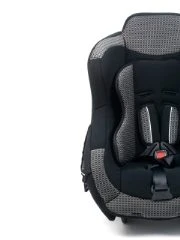
Each summer, we hear about heartbreaking stories of children being left alone in hot vehicles. KidsAndCars.org reports that approximately 717 children lost their lives in this manner between 1990 and 2013. In 2014 alone, HLN reports 21 incidents of children dying of heatstroke after being left inside a hot car. Two of those occurrences happened in Georgia.
In an effort to educate the public on hot car dangers, a Forsyth County Sheriff’s deputy filmed himself being locked inside a vehicle. Deputy Robin Regan documented being inside a car without air conditioning and with the windows up. At the beginning of the demonstration, the interior temperature was 96.7 degrees. After only seven minutes, the temperature inside the car reached 101 degrees. At the 20 minute mark, Regan exited the vehicle after measuring the temperature at 124.1 degrees. His heart rate upon exiting the vehicle was 151 beats per minute and he felt ill the remainder of the day. At one point during the experiment, the camera and electronics inside the car stopped working due to the heat. Deputy Regan’s video has now gone viral and has been viewed more than 4 million times.
The purpose of this experiment was to demonstrate just how hot the interior of a vehicle can become in a small amount of time. Studies have shown that it takes very little time for a vehicle’s interior temperature to rise, and that slightly opening or tinting windows does little to help regulate those temperatures.
Children are at higher risk in a hot vehicle than adults because their bodies heat up much faster. This is attributed to their bodies’ internal cooling system, or sweating, which is not as effective in a child’s body as it is in an adult’s. The smaller amount of skin on a child’s body allows less area for sweat to evaporate and cool internal temperatures. Once a child’s body temperature reaches 104°F, their organs begin shutting down. At 107°F, death is imminent. These types of conditions aren’t found only in hotter, southern states in the summer, though. Heatstroke deaths from being inside vehicles have occurred throughout the year and in every U.S. state, so regardless of where you are located, it is never safe to leave a child inside a vehicle alone or without air conditioning.
Of the children who lost their lives in hot vehicles, approximately 20% were left in the car knowingly. Many parents thought their child would be ok in the car while they ran a “quick” errand, but were mistaken. About 30% of those children who died of heatstroke in a vehicle entered the car without an adult realizing they had done so. The remaining 52% of children left in hot vehicles were accidents.
6 Tips To Not Forget Your Child In A Hot Car
“Accidental” occurrences may be hard to believe, but they happen quite often and are easier to do than you’d think. For this reason, we’ve provided a list of six steps to help drivers remember a child in the backseat:
- If your routine changes, be extra attentive. The chances of accidentally leaving a child in the car increase when routine deviates.
- Put a diaper bag or toy in the front seat of your car to remind you of your child.
- Leave an important item, such as your purse or cell phone, in the backseat. You’ll need these items every time you exit the vehicle, which will force you to look in the back seat.
- Locate the car seat in the middle of the backseat, as opposed to behind the driver. This makes it easier to see your child.
- Establish a system with your day care or other child-care provider. For instance, make sure the caregiver knows to call you if your child is ever not dropped off on time.
- “Look Before You Lock” – every single time. Make it a habit to check the backseat of your vehicle before you exit the car.
These tips are also important to go over with others who drive your child, such as partners, babysitters, and other family members.
Categories: Car Seat Safety, Catastrophic Injuries, Georgia Laws, Personal Injury, Safety Tips, Summer Safety




